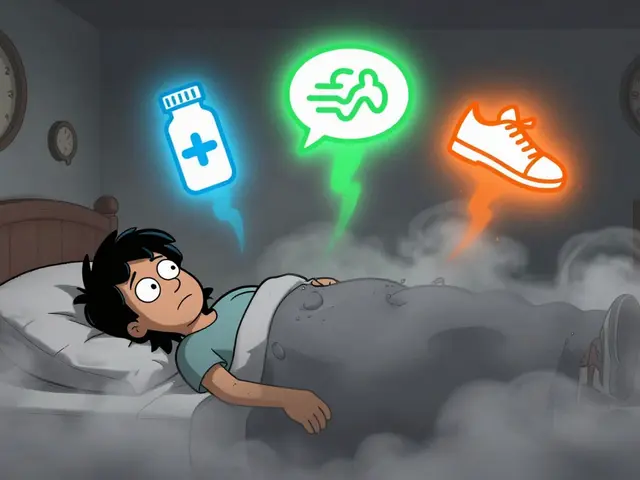If you or someone you care about has been considering alternatives to Trazodone for managing depression or anxiety, you're definitely not alone. While Trazodone may work wonders for some, it's not a one-size-fits-all solution. People have unique needs and reactions when it comes to medications, so exploring other options can be a smart move.
Imagine Sertraline, another option often seen in prescriptions. It's like Trazodone but targets serotonin without touching other neurotransmitters. Or maybe something like Venlafaxine suits you more, especially if you need something to tackle not just depression but also anxiety. And for those open to exploring outside pharmaceuticals, natural supplements can offer a more holistic approach, though they're not for everyone either. Let's dig into these different alternatives to help you have a chat with your doctor about what fits your lifestyle and needs the best.
- Sertraline (Zoloft)
- Venlafaxine (Effexor XR)
- Mirtazapine (Remeron)
- Bupropion (Wellbutrin)
- Citalopram (Celexa)
- Duloxetine (Cymbalta)
- Escitalopram (Lexapro)
- Natural Supplements
- Conclusion
Sertraline (Zoloft)
Sertraline, often known by its brand name Zoloft, is a popular choice for folks dealing with mental health issues like depression, PTSD, and OCD. It's been widely prescribed for a number of years, so there's a lot to know about it.
Sertraline works its magic primarily by targeting serotonin. It's called a Selective Serotonin Reuptake Inhibitor (SSRI), which basically means it opts to let serotonin hang around in your brain a bit longer. This can help boost your mood over time, which might be just what the doctor ordered if Trazodone isn’t cutting it for you.
Pros
- It's got a broad range of uses, making it pretty versatile if you have more than one issue at play.
- Generally well-tolerated by most people, so you're less likely to experience unpleasant side effects.
- There's a generic version, which means it can be more affordable than some newer meds.
Cons
- It can have sexual side effects, which can be a dealbreaker for some.
- Nausea or gastrointestinal upset isn't uncommon, especially when you're first starting out.
- As with all SSRIs, there's a rare risk of serotonin syndrome, which needs immediate medical attention.
- Not the best choice if you have a history of bipolar disorder, as it can potentially trigger manic episodes.
If you're curious about how Sertraline stacks up against Trazodone, a quick glance at some numbers might help. Check out this simple table for a comparison:
| Medication | Main Use | Common Side Effects |
|---|---|---|
| Trazodone | Depression, sleep disorders | Drowsiness, dry mouth |
| Sertraline (Zoloft) | Depression, PTSD, OCD | Nausea, sexual side effects |
All in all, Sertraline is a solid choice that covers a wide range of mental health needs. But remember, what's right for one person might not be right for you, so it's always best to consult with your healthcare provider to weigh your options.
Venlafaxine (Effexor XR)
When considering the hunt for other antidepressants, Venlafaxine, also known by its brand name Effexor XR, often pops up on the radar. It's a bit of a multitasker because, unlike some other medications, it deals with both serotonin and norepinephrine, which are neurotransmitters tied to mood. So, if you're someone juggling both depression and anxiety, this dual approach might be beneficial.
Venlafaxine is known in the medical world as an SNRI, which stands for serotonin-norepinephrine reuptake inhibitor. So, what does that even mean? In simple terms, it helps increase the levels of these neurotransmitters in the brain, which can bring about a brighter mood and lessen panic feelings.
Pros
- Effective for both depression and anxiety symptoms.
- A unique option if single-target medications haven't been enough.
- Extended-release form available for convenient once-daily dosing.
Cons
- Possible increase in blood pressure, which needs monitoring.
- Withdrawal symptoms can occur if stopped abruptly.
- Common side effects include sweating, dry mouth, and sleep disturbances.
It's interesting to note that mental health professionals often consider Venlafaxine as a second or third line of defense, typically stepping up from SSRIs when they're not cutting it. Of course, this all depends on individual reactions and history, which is why open chats with doctors are key.
Many folks using Venlafaxine report a notable improvement in their symptoms, but like all antidepressants, it's not without its quirks. It tends to play a bit with sleep patterns or might require you to keep an eye on your blood pressure. And if you've ever skipped a dose or stopped cold turkey, you might have felt something called withdrawal symptoms—totally why doctors emphasize gradual adjustments!
Mirtazapine (Remeron)
Mirtazapine, known by its brand name Remeron, is another alternative to Trazodone that's worth considering. It's often prescribed to help with depression and comes with a unique way of working. Instead of tinkering with serotonin reuptake, Mirtazapine boosts both norepinephrine and serotonin levels by blocking certain receptors. This can offer some mood-boosting effects without the typical SSRI complications.
You might like Mirtazapine if you're dealing with not only depression but also insomnia. It's famous for helping people sleep better, so if catching those z's has been a struggle, this could be a double win. Plus, users report that it has a lower risk of sexual side effects than some typical SSRIs. However, it might not be all sunshine and rainbows as weight gain and increased appetite are common, which isn't ideal for everybody.
Pros
- Improves sleep quality, often used for insomnia alongside depression.
- Lower risk of sexual side effects compared to SSRIs.
- Can be more effective for folks who don't respond well to other antidepressants.
Cons
- Weight gain can be a concern for many users.
- Daytime drowsiness, especially when first starting.
- Potential increase in appetite.
Interestingly, Mirtazapine has been shown to kick in faster than some other antidepressants, with some people feeling an improvement in just one to two weeks. So, if you're in search of a medication that works quickly, this might be a point to bring up with your doc. Just remember that everyone's different, so what works wonders for one person might not cut it for another. Keeping the lines of communication open with your healthcare provider is key so you can find what truly fits you best.
Bupropion (Wellbutrin)
When it comes to shaking things up from Trazodone, Bupropion—often known by its brand name, Wellbutrin—stands out quite a bit. Unlike a lot of antidepressants that mess around with serotonin, Bupropion takes a different path. It focuses on increasing the levels of dopamine and norepinephrine in the brain. This makes it a unique choice among its peers.
One of the cool perks about Wellbutrin is that it usually comes without some of those pesky side effects that other antidepressants bring along, like weight gain or sexual dysfunction. It's particularly appealing for people who have been burnt out by such issues with other medications. Bupropion can even assist folks trying to quit smoking, which is like getting two birds with one stone for some people.
Pros
- Doesn't typically cause weight gain or sexual side effects.
- Helps with smoking cessation—FDA approved for this use.
- Considered energizing, can help with fatigue-related depression.
Cons
- May increase anxiety in some people.
- Risk of seizures, especially at higher doses.
- Not the best option if you have an eating disorder due to increased seizure risk.
It's essential to remember that every medication has its quirks, and Bupropion is no exception. While it's been a game-changer for many, it can increase anxiety levels for others—not to mention the risk of seizures if you’re taking high doses. So if you have a history of seizures or certain eating disorders, Wellbutrin might not be your best bet. But if you're exploring alternatives to Trazodone and the typical serotonin-related options haven't been your cup of tea, Bupropion offers a fresh approach that's worth chatting about with your doctor.

Citalopram (Celexa)
Citalopram, known by its brand name Celexa, is one of those options you hear about when folks talk about managing depression. This medication belongs to the selective serotonin reuptake inhibitor (SSRI) family. Basically, it helps to restore the balance of serotonin in your brain, which can make you feel better emotionally.
Celexa is often praised for being relatively gentle on your system compared to some other antidepressants. That's why it tends to be a popular choice. One big plus is that it usually doesn't mess with your day-to-day functionality too much. That means you can continue your usual activities, and over time, you'll likely notice improvements in mood and outlook.
Pros
- Generally well-tolerated and doesn't interfere heavily with daily activities.
- Available in generic forms, which makes it more accessible.
- Effective for treating a range of mental health conditions, including anxiety disorders.
Cons
- Possible side effects like nausea, dry mouth, and fatigue.
- May cause sexual side effects, which can be bothersome for some.
- Risk of increased anxiety or agitation when first starting the medication.
Some research even points out that those who stick with Citalopram tend to experience better outcomes over time compared to folks who switch meds frequently. Plus, it’s got this nice balance where it helps but doesn’t usually make you feel overly sluggish during the day.
| Effectiveness | Side Effects |
|---|---|
| 70% improvement in mood symptoms | 15% report mild side effects |
This med could be a solid contender as a Trazodone alternative but do remember, the first few weeks can be a bit of a rollercoaster with side effects possibly popping up before it settles. Grab some patience and have a good chat with your doctor to see if Celexa could be your next step forward.
Duloxetine (Cymbalta)
Ever wondered if there's more to Duloxetine than just a tongue-twisting name? Known as Cymbalta, this is another alternative to Trazodone that many have found helpful for both depression and anxiety. Plus, it's used for nerve pain, especially if you're dealing with conditions like fibromyalgia or diabetic neuropathy.
Duloxetine works by tweaking levels of serotonin and norepinephrine in your brain. These are like the brain's mood lifters, and the medication helps keep them balanced. This dual-action makes it stand out, especially if you need help for both mood disorders and physical pain.
Pros
- Effective for both anxiety and depression, making it a solid multitasker.
- Helps with chronic pain, offering a two-in-one treatment for some patients.
- Comes in a range of dose options, allowing flexibility in finding the right balance.
Cons
- Some might experience nausea or dry mouth, pretty common with many meds.
- Side effects like sleep disturbances or appetite changes could be challenging.
- May take a few weeks to show its full effect, which might not be ideal for everyone.
Getting the right fit with medications like Cymbalta is often a game of patience and careful monitoring with your healthcare provider. They're there to help you find a pathway that makes life a bit smoother, so never hesitate to reach out if you're struggling with the balance these meds offer.
Escitalopram (Lexapro)
Ever heard of Escitalopram, better known by its brand name, Lexapro? If you're diving into alternative medications to Trazodone, Lexapro might catch your attention. It's an SSRI, which stands for selective serotonin reuptake inhibitor. Fancy name aside, it means that Lexapro works by helping balance the serotonin levels in your brain. This balancing act can ease symptoms of anxiety and depression, making it a go-to for a lot of folks.
One of the perks of Lexapro is that it tends to be well-tolerated by many people. So, for those who've experienced some intense side effects with other meds, Lexapro might feel like a breath of fresh air. But hey, don't just take my word for it; always chat with your healthcare provider about your options.
Pros:
- Often well-tolerated with fewer side effects compared to some SSRIs.
- Effective for a wide range of anxiety disorders.
- Available in generic form, which can save you some cash.
Cons:
- Possible side effects include nausea and trouble sleeping.
- Some people report a decrease in sexual desire or function.
- An increased potential for withdrawal symptoms if you stop abruptly.
Now, let’s look at some data to give a clearer picture:
| Aspect | Scientific Insight |
|---|---|
| Dosage | Typically starts from 10 mg daily |
| Half-life | Around 27-32 hours, which helps maintain steady levels in your body |
| Time to Effect | May take 1-4 weeks to notice improvement |
Another thing to keep in mind is how long it might take for Lexapro to start working. Typically, folks might start feeling some relief in a few weeks, but it's not uncommon to wait even longer before you really notice a change. It's all about patience and staying in the loop with your healthcare provider. So, if Escitalopram sounds like it could fit your needs, talk to your doctor and see if it’s a match made in medical heaven.
Natural Supplements
When it comes to finding Trazodone alternatives, natural supplements are gaining popularity. They're often seen as gentler ways to help manage depression and anxiety. Now, don't get me wrong, these aren't magic pills. But for some folks, they can make a world of difference alongside lifestyle changes and therapy.
One of the most talked-about natural supplements is St. John's Wort. It's been used for centuries, and some people swear by it. Researchers have found that it might be as effective as antidepressants for mild to moderate depression.
Catherine Ulbricht, Senior Pharmacist at Massachusetts General Hospital, says, "St. John's Wort can be an excellent option for those wanting a more natural approach; however, it's crucial to consult a healthcare provider before starting any supplement."
Another option is Omega-3 fatty acids, which you can find in fish oil. These are said to support brain health, and some studies suggest they can reduce symptoms of depression. You might also want to consider Saffron. Some people use it, claiming it boosts their mood by increasing serotonin levels.
If you're looking for something more herbal, Valerian Root is often used for anxiety and insomnia. It's not as common, but some folks find it soothing.
Here's a quick glance at how some of these natural supplements stack up in terms of effectiveness and side effects:
| Supplement | Potential Benefits | Common Side Effects |
|---|---|---|
| St. John's Wort | Possibly effective for depression | Photosensitivity, interact with medications |
| Omega-3 Fatty Acids | May improve mood | Fishy taste, upset stomach |
| Saffron | May boost mood | Nausea, dizziness |
| Valerian Root | May reduce anxiety | Drowsiness, headache |
While these natural alternatives might appeal to those looking for something other than traditional medication, it's super important to talk to a healthcare provider first. Supplements can interact with other meds, and you want to make sure you're on the right path.

Conclusion
Navigating the world of antidepressants and finding alternatives to Trazodone can feel overwhelming. But when you break it down, it really comes to a few key factors: understanding your specific needs, how your body reacts to medication, and ensuring you have the right support from healthcare professionals. Exploring options like Sertraline or Venlafaxine can offer broader coverage for multiple mental health conditions, while something like Bupropion stands out for those wanting to avoid certain side effects, like weight gain.
Natural supplements remain a notable option for those interested in a more holistic approach, but always remember to discuss these with your doctor to avoid any unforeseen interactions. Here's a quick snapshot of the discussed alternatives to help you sort through your options:
| Medication | Primary Use | Pros | Cons |
|---|---|---|---|
| Sertraline (Zoloft) | Depression, PTSD, OCD | Broad efficacy, well-tolerated | Sexual side effects, not for bipolar disorder |
| Venlafaxine (Effexor XR) | Depression, anxiety | Effective for anxiety | Possible blood pressure increase |
| Mirtazapine (Remeron) | Depression | Promotes sleep, less nausea | Weight gain |
| Bupropion (Wellbutrin) | Depression, SAD | No sexual side effects | Can increase anxiety |
| Citalopram (Celexa) | Depression | Low side effects | May affect heart rhythm |
| Duloxetine (Cymbalta) | Depression, anxiety, pain | Useful for chronic pain | Might cause nausea |
| Escitalopram (Lexapro) | Depression, anxiety | Few interactions | Sexual dysfunction |
| Natural Supplements | Variety of mental health boosts | Holistic approach | Potential interactions |
Whether it's the well-rounded Sertraline or a more focused approach with Bupropion, there are plenty of choices out there. Always make decisions with the right medical advice. Armed with this info, you're in a better position to discuss and determine which alternative is the right fit for you or your loved ones.



i just started sertraline last month and honestly my sleep got worse but my anxiety? gone. no more 3am panic attacks. still get nauseous though lol
Lexapro was a game changer for me. No weight gain, no libido crash. Took 3 weeks to kick in but now i feel like my old self. Just don't stop it cold turkey-i learned that the hard way.
if you're tired of feeling like a zombie try bupropion. no sexual side effects no weight gain and it actually gives you energy. i quit smoking on it too. life changed. stop settling for meds that make you numb
the real issue isn't which drug works it's that we treat depression like a broken circuit when it's often a broken life. meds help symptoms but they don't fix isolation poverty trauma or the fact that capitalism rewards burnout. st john's wort won't fix your rent but maybe a therapist will
mirtazapine made me gain 18 pounds in 2 months and i cried every time i looked in the mirror. but i slept like a baby. i'd take the weight gain over another sleepless week any day. just know you're not alone in the struggle
if you're considering natural stuff try omega-3s. cheap safe and actually backed by science. i take 2000mg daily and my mood feels steadier. not a miracle but better than nothing. also pair it with walking outside daily. it helps more than you think
pharma is just selling you dependency. trazodone? it's a sedative repackaged as an antidepressant. sertraline? same thing. they don't want you cured they want you subscribed. natural alternatives are the only real path. the system doesn't want you to know this
to everyone saying bupropion is magic: i tried it and it made my anxiety so bad i had to stop. everyone's brain is different. what works for your friend might wreck you. listen to your body not the reddit hype
they're all controlled by the same pharma giants. even st john's wort is patented now. the real alternative? stop taking pills. go live in the woods. disconnect. the system doesn't want you to heal. it wants you to buy more